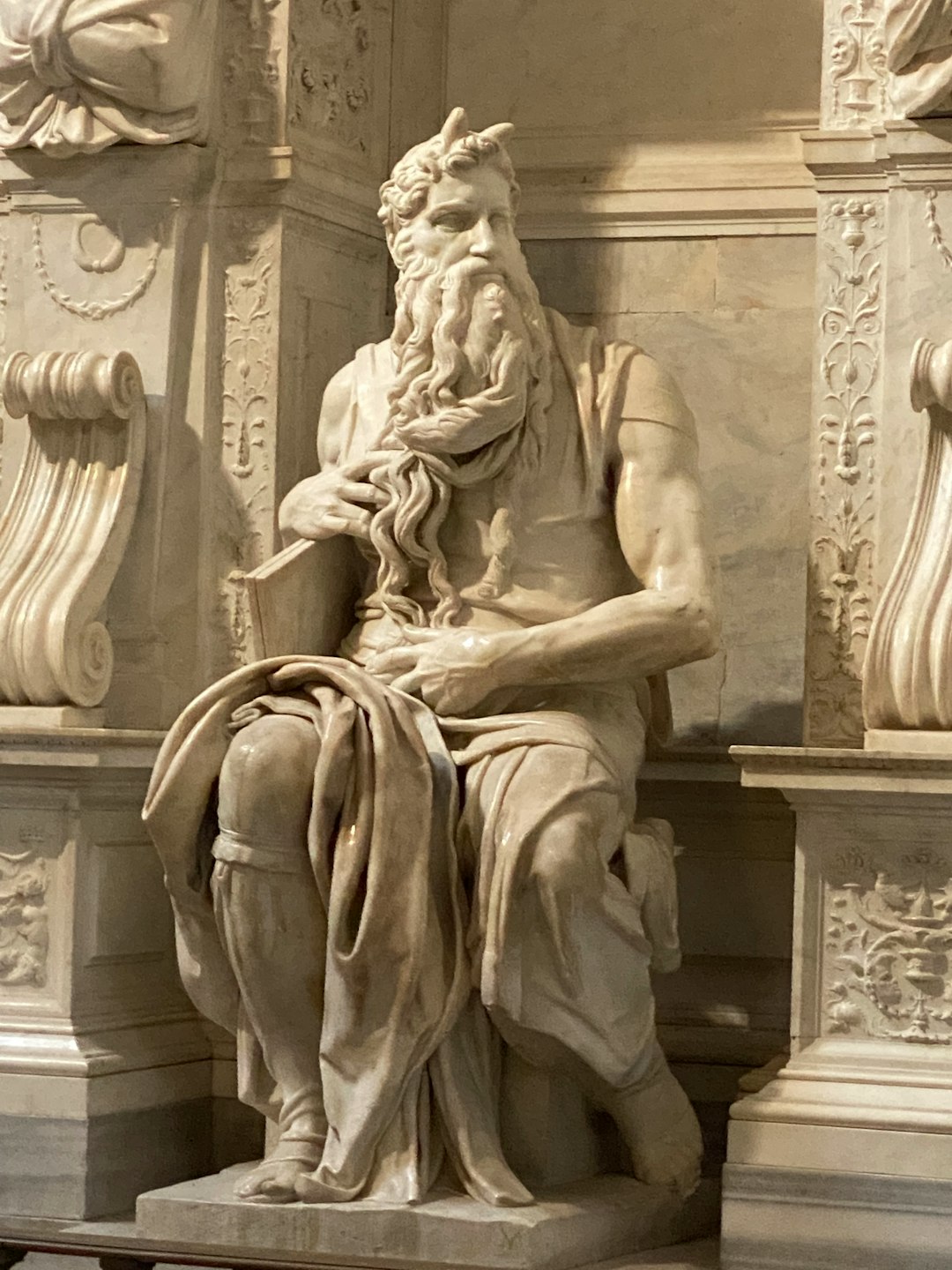An Exploration of Galatians: Stand Firm and Don’t Fall from Grace
Galatians 5:1-6 - Faith in Christ Jesus works through love. Do not put on a yoke of slavery again.

”It was for freedom that Christ set us free; therefore keep standing firm and do not be subject again to a yoke of slavery. Behold I, Paul, say to you that if you receive circumcision, Christ will be of no benefit to you. And I testify again to every man who receives circumcision, that he is under obligation to keep the whole Law. You have been severed from Christ, you who are seeking to be justified by law; you have fallen from grace. For we through the Spirit, by faith, are waiting for the hope of righteousness. For in Christ Jesus neither circumcision nor uncircumcision means anything, but faith working through love.“
Galatians 5:1-6 NASB1995
The first verse of Galatians 5 is a summary of the first four chapters and is considered a pivotal verse in this epistle. Let’s do some word studies to start this off.
First, freedom comes from the Greek word ἐλευθερία or eleutheria and it has these definitions:
liberty to do or to omit things having no relationship to salvation
fancied liberty
licence, the liberty to do as one pleases
true liberty is living as we should not as we please
As we will see later in Galatians 5, this eleutheria is the true liberty of living as we should, not as we please. Freedom does not mean licentiousness or sinning as you please. The root word free (eleutheroo) means liberty from the dominion of sin.
Second, keep standing firm comes from the Greek verb στήκω or steko, with these meanings and Biblical usages:
to stand firm
to persevere, to persist
to keep one's standing
I always love definitions that are circular (e.g., the definition is the same as the phrase that you are trying to understand). Perhaps it helps to look at the second usage: to persevere or persist.
Third, slavery comes from the Greek word δουλεία or douleia and I like the Strong’s definition best for this word:
slavery, bondage, the condition of a slave: τῆς φθορᾶς, the bondage which consists in decay [Winers Grammar, § 59, 8 a., cf. Buttmann, 78 (68)], equivalent to the law, the necessity, of perishing, Romans 8:21; used of the slavish sense of fear, devoid alike of buoyancy of spirit and of trust in God, such as is produced by the thought of death, Hebrews 2:15, as well as by the Mosaic law in its votaries, Romans 8:15 (πνεῦμαδουλείας); the Mosaic system is said to cause δουλεία on account of the grievous burdens its precepts impose upon its adherents: Galatians 4:24; Galatians 5:1.
The Mosaic system of laws is said to cause slavery because of its grievous burdens on its adherents. Precept Austin found a superb commentary on freedom and slavery from Chuck Swindoll, the founder of Insight for Living. Even when people are told they are free, they still can suffer under the pain of slavery:
Back in the nineteenth century our sixteenth president realized something radical must be done about slavery in our country. Unwilling to look the other way any longer, on September 22, 1862, he presented what came to be known as the Emancipation Proclamation, an official document condemning human slavery. Abraham Lincoln, realizing that slavery is completely against human dignity, officially abolished it from the United States on that day. Tragically, little changed in the daily life of our nation, even though the slaves were officially declared free. You know why; you’ve read the stories. The Civil War was still going on.
The plantation owners never informed their slaves. The vast majority of the former slaves couldn’t read, so they had no idea what the news was carrying. There was no mass media then to announce those kinds of presidential pronouncements. And so for the longest time, slavery continued even though it had been officially brought to an end. The war ended in April 1865.
Do you know when Lincoln’s declaration was officially enacted? When the people finally began to leave their enslaved lives and make their way toward freedom? December 18, 1865—more than three years after he first released his proclamation. Lincoln had been dead for months. The word traveled out of the streets of Washington and down into the Shenandoah Valley of Virginia, across the back roads of the Carolinas and into Georgia, then Alabama, then Mississippi, then Louisiana, then Texas, then Arkansas, announcing what had been true for more than a thousand days. Even then the word somehow either wasn’t believed or wasn’t acted upon. Those officially emancipated people, thinking slavery was the way they were condemned to exist, continued to live in bondage though they had been declared free men and women since the fall of 1862.

Paul now goes on to say some of the most challenging things to the Galatians who are falling under the spell of the Judaizers. First, he says that if they follow through on the need to be circumcised to “add” to their faith, Christ is no longer of use to them. What’s the big deal about doing circumcision, anyway? Many, if not most, of the boys born in this country over a certain age were circumcised involuntarily (mostly for hygiene purposes) by major, secular hospitals. I’m not going to go down the bunny trail of explaining exactly what this means physically (blush), but is Paul making much ado about nothing? NO! Here’s a great explanation from Enduring Word:
If you become circumcised, Christ will profit you nothing: When we embrace the law as our rule of walking with God, we must let go of Jesus. He is no longer our righteousness; we attempt to earn it ourselves. For the Galatians in this context, to receive circumcision – the ritual that testified that a Gentile was coming under the law – meant that he no longer trusted in Jesus as His righteousness, but trusted in himself instead. So Paul could say “Christ will profit you nothing.”
The legalists among the Galatians wanted them to think that they could have both Jesus and a law-relationship with God. Paul tells them that this is not an option open to them – the system of grace and the system of law are incompatible. “Whoever wants to have a half-Christ loses the whole.” (John Calvin)
“Circumcision is the seal of the law. He who willingly and deliberately undergoes circumcision, enters upon a compact to fulfill the law. To fulfill it therefore he is bound, and he cannot plead the grace of Christ; for he has entered on another mode of justification.” (J.B. Lightfoot)
How tragic! Jesus, dying on the cross, pouring out His blood, His life, His soul, His agony, His love for us – and it will profit you nothing! Two men died with Jesus; for the one who put his trust in Jesus, it was eternal life. For the one who trusted in himself, it profited him nothing.
This point was so important to Paul that he mustered all the strength he could in a personal appeal: he began with Indeed I, Paul. When he continued on and wrote I testify, Paul remembered his former training as a lawyer – and was deadly serious. “Tongue cannot express, nor heart conceive what a terrible thing it is to make Christ worthless.” (Martin Luther)
This is hard-hitting! You are turning away from Christ and saying that you will be responsible for your further justification by following the law. You are making the sacrifice of the Son of God worthless.
It gets more difficult: Paul says that if you take on this legalism, then you are bound to follow ALL of the law. Let’s get some insight again from Enduring Word:
Again, the legalists among the Galatians wanted them to think they could observe some aspects of the law without coming under the entire law. But when we choose to walk by law, we must walk by the whole law.
If we come to God on the basis of our own law keeping we must keep the whole law and our law-keeping must be perfect. No amount of obedience makes up for one act of disobedience; if you are pulled over for speeding, it will do no good to protest that you are a faithful husband, a good taxpayer, and have obeyed the speed limit many times. All of that is irrelevant. You have still broken the speeding law and are guilty under it.
This does not mean that the mere act of being circumcised means that someone is under a legal relationship with God, and must keep the whole law for salvation. Paul spoke to the Gentile Christians among the Galatians, who were being drawn to circumcision as adults, as evidence that they had come under the Law of Moses as the “first step” to salvation. We will later see that Paul didn’t care one way or another about circumcision (Galatians 5:6). What he detested was the theology of circumcision as presented by the legalists.

Paul now lays down the big one: You have been severed from Christ, you who are seeking to be justified by law; you have fallen from grace. Good Grief! Does this mean your salvation is at risk? I read dozens of commentaries to see what Biblical scholars think and the answer is that your salvation (justification) is still intact if you believe, but you have lost the means of grace through the Holy Spirit for your sanctification. Now you are in the joyless and miserable world of embracing more and more legalistic means to sanctify yourself, falling away from the priceless grace that Christ gave us. You have imprisoned yourself in a monastic cell, doing self-flagellation for penance.
Here’s a terrific commentary from John MacArthur in Precept Austin:
Paul is not dealing with the security of the believer but with the contrasting ways of grace and law, works and faith, as means of salvation. He is not teaching that a person who has once been justified can lose his righteous standing before God and become lost again by being circumcised or otherwise legalistic. The Bible knows nothing of becoming unjustified. Those "whom [God] predestined, these He also called; and whom He called, these He also justified; and whom He justified, these He also glorified" (Ro 8:30+).
Paul's primary point in this passage, as throughout the letter, is that law and grace cannot be mixed. As a means to salvation they are totally incompatible and mutually exclusive. To mix law with grace is to obliterate grace. For a believer to start living again under the law to merit salvation is, in fact, to reject salvation by grace. Contrary to the teaching of the Judaizers, to add circumcision and other works of the law to what Christ accomplished by grace is not to raise one's spiritual level but to severely lower it. Legalism does not please God but offends Him. It does not bring a person closer to God but rather drives him away....
Contrary to justifying grace, sanctifying grace is interruptible. Living by the flesh interferes with living by the Spirit, and living by the flesh may even involve doing the right things for the wrong reasons or in the wrong way. For example, to worship God from the heart and for His own sake is to live by the Spirit. But to worship Him only outwardly or to impress others with our supposed spirituality is to live by the flesh. To witness to a person while trusting in God to convict and convert him is to live by the Spirit. To witness with the intention of converting a person through our own knowledge of Scripture and powers of persuasion is to live by the flesh. No matter how worthy and God-ordained a person's outward activities may be, to perform them by the flesh is to live by the way of law and to forsake the way of grace.
Paul ends this passage this way: For we through the Spirit, by faith, are waiting for the hope of righteousness. For in Christ Jesus neither circumcision nor uncircumcision means anything, but faith working through love. Our righteousness is a hope that comes through the Spirit, by faith. I recall a few years ago (when Steve and I had returned to faith, but were still attending the Lutheran church) asking some other women in a Bible study about how we can know the Holy Spirit is working in us. They all stared at me like I was speaking in tongues, because although we as a church body confessed* every Sunday to believing in the Holy Spirit, not much was ever done to really teach about it. The Holy Spirit was an afterthought or even a “she”, in the vernacular of one of the more progressive female ministers we endured. I was always looking for a Damascus moment, a bolt of lightning that invaded my soul. But the Spirit is subtle, moved by faith, and it works through love and our identity in Christ Jesus. Legalisms, which is the way of the flesh, mean nothing.
*Opinion ahead: I now consider that rote, mumbling confession of faith to be a type of legalism. We all stood when directed, we all said it (Apostle’s or Nicene Creed), but did we mean it or even listen to ourselves? I was even told, by more than one person, in a private social media group that exists to discuss ELCA apostasy that my mortal soul was in danger because we didn’t move on to a more traditional “confessing” and Bible-based Lutheran church after we left our ELCA church but went “non-denominational” in our next church choice. Obviously, these folks were focused on “right” methodology, not grace and hope in faith.
My next devotional examines Galatians 5:7-12, Leaven in the Dough.
Heaven on Wheels Daily Prayer:
Dear Lord - I offer the words of this hymn to you today, by Horatius Bonar (1846):
1 I heard the voice of Jesus say,
“Come unto Me and rest;
lay down, thou weary one, lay down
thy head upon My breast.”
I came to Jesus as I was,
so weary, worn, and sad;
I found in Him a resting place,
and He has made me glad.
2 I heard the voice of Jesus say,
“Behold, I freely give
the living water, thirsty one;
stoop down, and drink, and live.”
I came to Jesus, and I drank
of that life-giving stream;
my thirst was quenched, my soul revived,
and now I live in Him.
3 I heard the voice of Jesus say,
“I am this dark world’s Light;
look unto Me, thy morn shall rise,
and all thy day be bright.”
I looked to Jesus, and I found
in Him my Star, my Sun;
and in that Light of life I’ll walk,
till trav'ling days are done.
Source: Psalms and Hymns to the Living God #327
Scripture quotations taken from the (NASB®) New American Standard Bible®, Copyright © 1960, 1971, 1977, 1995 by The Lockman Foundation. Used by permission. All rights reserved. lockman.org
The Blue Letter Bible was accessed on 12/14 to review the Greek lexicon for freedom, standing firm and slavery.
Commentary from Enduring Word by David Guzik is used with written permission.
The personal testimony of Bruce Hurt, creator of the Precept Austin commentary and sermon collections, can be found Here.


